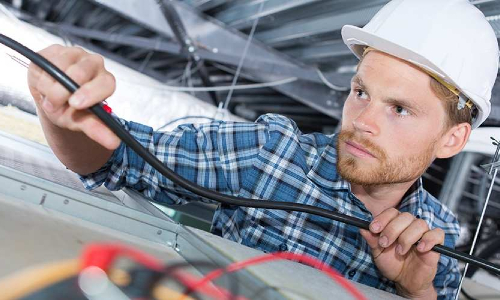DHS Labels Integrators as ‘Essential Critical Infrastructure Workers’
DHS guidelines would allow techs to continue installing systems across a range of market niches, including home offices during the coronavirus crisis.

Technicians are classified by the U.S. government as essential workers during the COVID-19 outbreak.
WASHINGTON, D.C. — Integration companies may be exempted from coronavirus regulations that call for a work stoppage in a local area. That’s because the U.S. Department of Homeland Security (DHS) has identified integrators as “essential critical infrastructure workers during the COVID-19 response.”
The DHS guidelines from the Cybersecurity and Infrastructure Agency (CISA) are intended to assist both state and local officials when making decisions regarding essential workers in their own jurisdictions. CISA’s identification of “essential critical infrastructure workers” is “intended to be overly inclusive reflecting the diversity of industries across the United States.”
NOTE: These are DHS guidelines and are NOT a mandate to state or local jurisdictions, which can set their own rules. But if the local municipality follows the DHS guidelines, integrators can continue working.
The CISA Guidance lists 14 categories of “essential critical infrastructure workers”:
- Health Care/Public Health
- Law Enforcement, Public Safety, First Responders
- Food and Agriculture
- Energy
- Water and Wastewater
- Transportation and Logistics
- Public Works
- Communications and Information Technology
- Other Community-Based Government Operations and Essential Functions
- Critical Manufacturing
- Hazardous Materials
- Financial Services
- Chemical
- Defense Industrial Base
The guidelines can encompass residential work as well. In a memo from CEDIA‘s director of government affairs, Darren Reaman, he notes: “The rapid government response through executive action, regulatory changes and legislation at the local, state and federal level to the COVID-19 virus is unprecedented.
“We understand CEDIA members across the country are contending with executive and legislative action that potentially impacts the installation and maintenance of residential technology in thousands of jurisdictions across the country because of confusion over defining the essential services critical to the country’s infrastructure.”
The guidelines provide strategic guidance toward the unified effort to maintain the country’s critical infrastructure “and as such we believe these guidelines serve an important role as communities respond with executive and legislative action,” according to Reaman.
The list of “Essential Critical Infrastructure Workers” identified by the CISA Report include:
- Maintenance of communications infrastructure including privately owned and maintained communication systems supported by technicians, operators, call-centers, wireline and wireless providers, cable service providers, satellite operations, undersea cable landing stations, Internet exchange points, and manufacturers and distributors of communications equipment
- Installation, maintenance and repair technicians that establish, support or repair service as needed
- Customer service and support staff, including managed and professional services as well as remote providers of support to transitioning employees to set up and maintain home offices, who interface with customers to manage or support service environments and security issues, including payroll, billing, fraud, and troubleshooting
- Dispatchers involved with service repair and restoration
For questions, contact CISA at [email protected].
This article first appeared on SSI sister publication cepro.com.
If you enjoyed this article and want to receive more valuable industry content like this, click here to sign up for our FREE digital newsletters!

Security Is Our Business, Too
For professionals who recommend, buy and install all types of electronic security equipment, a free subscription to Commercial Integrator + Security Sales & Integration is like having a consultant on call. You’ll find an ideal balance of technology and business coverage, with installation tips and techniques for products and updates on how to add to your bottom line.
A FREE subscription to the top resource for security and integration industry will prove to be invaluable.














